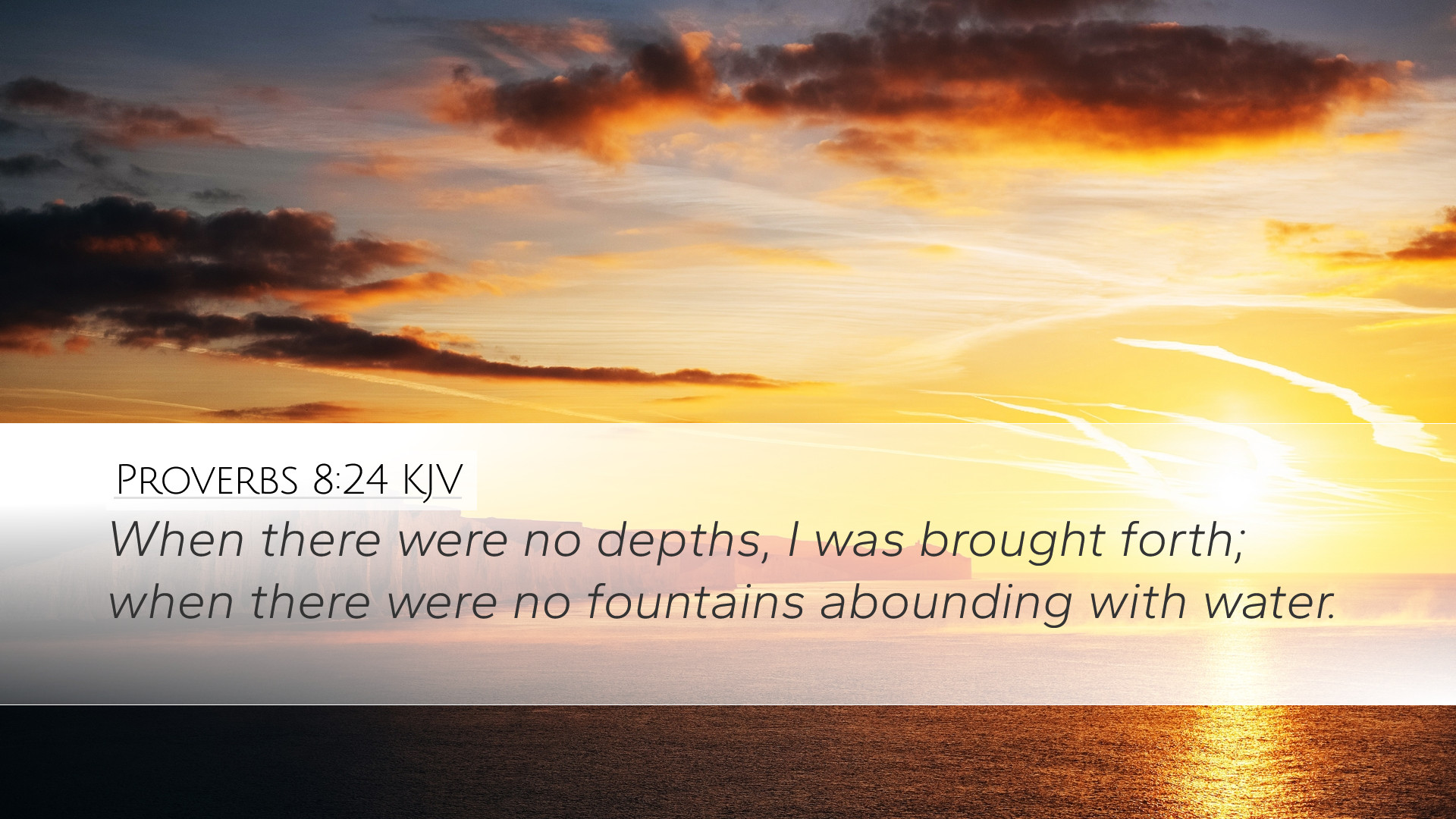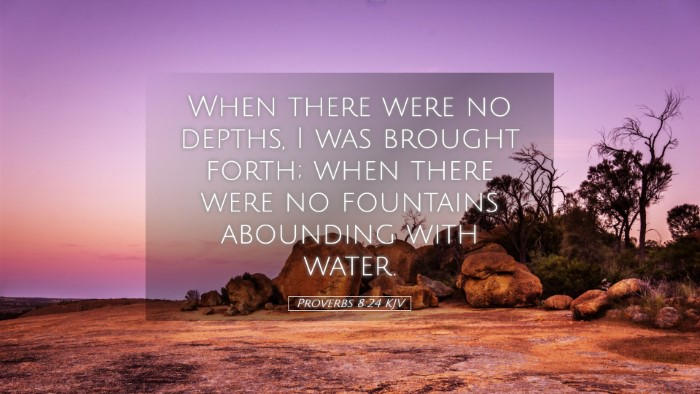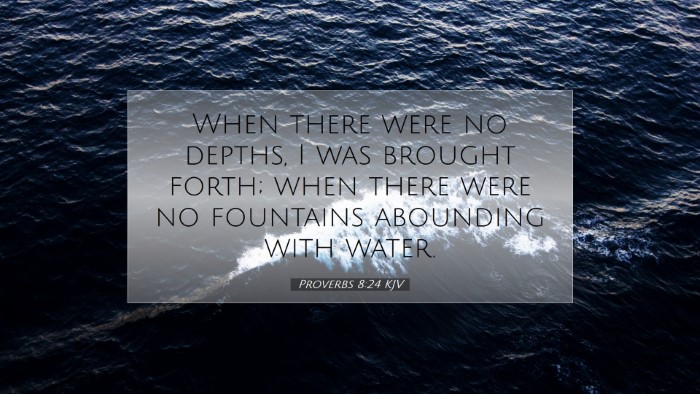Bible Commentary on Proverbs 8:24
Proverbs 8:24 states: "When there were no depths, I was brought forth; when there were no springs abounding with water." This verse is part of a passage emphasizing the nature and attributes of wisdom as personified in the text. The opening chapters of Proverbs establish the voice of wisdom, illustrated as an active participant in the creation and sustenance of the universe.
Insights from Public Domain Commentaries
1. Matthew Henry's Commentary
Matthew Henry emphasis on the personification of wisdom illustrates her existence before the creation of the world. He interprets wisdom's rhetoric as a way to signify that she was not a mere act of creation but rather foundational to the very fabric of existence. He notes:
- The "depths" refer to the vastness of the sea: In ancient thought, the depths were often associated with chaos and uncertainty. Wisdom claims her place before this chaos was formed, suggesting that true understanding transcends even the most chaotic elements of life.
- The "springs abounding with water": Water often symbolizes life and sustenance. By stating that she existed when there were no springs, wisdom emphasizes her vital role in providing life and clarity.
Henry encourages readers to seek wisdom, as it is essential to navigating the circumstances of life. He recognizes that her pre-existence echoes the divine wisdom in creation, thus making her essential for understanding the world.
2. Albert Barnes' Commentary
Albert Barnes expands on the metaphor of wisdom existing before creation. He points out that this verse reflects the priority of wisdom and its importance in the divine order. Barnes elaborates on several key points:
- Time of Creation: Wisdom's declaration of existing "when there were no depths" suggests she existed in the relational aspect of creation. Before material existence came into being, wisdom was already present.
- Symbolism of Water: Barnes likens wisdom to water in a spiritual sense, reflecting its quenching power for spiritual thirst and knowledge. Just as physical water provides hydration and sustenance, wisdom nourishes the soul.
- Invitation to Seek Wisdom: Similar to Henry, Barnes underscores the necessity of pursuing wisdom. It substantiates the understanding that wisdom is not an abstract idea but an active force in our lives.
In the context of spiritual education, Barnes urges readers to consider wisdom's role in the formation of not just society but also personal spirituality.
3. Adam Clarke's Commentary
Adam Clarke offers a detailed exploration of the verse, providing cultural and linguistic insights that deepen the understanding of wisdom's implications. His commentary includes:
- Creation Context: Clarke explains the phrase, "when there were no depths," as a way to convey the timeless nature of wisdom, distinct from the physical created world. This indicates a fundamental truth about God’s creative process, wherein wisdom has been integral.
- Philosophical Implications: Clarke draws attention to philosophical aspects, suggesting that this verse reflects a metaphysical understanding of existence. Wisdom is not only used to describe creation but asserts a metaphysical principle where knowledge precedes existence.
- Practical Application: Clarke emphasizes that, for believers today, wisdom offers guidance in daily decision-making. The preeminence of wisdom should drive believers to consider the depth of its application in their lives.
Clarke’s nuanced perspective reminds readers that understanding wisdom is foundational to a fruitful and spiritually fulfilling life.
Theological Significance
The theological backdrop of Proverbs 8:24 offers rich implications for Christian doctrine. The pre-existence of wisdom foreshadows the New Testament’s portrayal of Christ as the embodiment of wisdom. This verse serves as a bridge between the wisdom literature of the Old Testament and the Christological themes in the New Testament.
- Christ as Wisdom: In the New Testament, particularly in 1 Corinthians 1:24, Paul refers to Christ as "the power of God and the wisdom of God." This connection posits that understanding wisdom is fundamental to grasping the nature of Christ.
- Creation's Order: Wisdom’s role in creation affirms God’s orderly design for the universe. Wisdom’s precedence indicates that believers ought to seek divine insight as they navigate life’s complexities.
- Integration of Knowledge and Faith: Proverbs 8:24 invites pastors and theologians to integrate their intellectual pursuits with faith. Knowledge, rooted in wisdom, becomes an essential aspect of spiritual formation and discipleship.
- Ethical Implications: Wisdom’s foundational role booms a call to ethical living, grounding moral actions in a divine understanding of rightness and justice.
Conclusion
Proverbs 8:24 brings to light the profound connection between wisdom and creation. By examining Dr. Matthew Henry, Albert Barnes, and Adam Clarke's contributions, readers are encouraged to appreciate wisdom's eternal nature and active role in both the cosmos and everyday life. This multifaceted perspective on wisdom serves as an invitation for deeper exploration of faith, urging believers to seek wisdom in all aspects of existence.


